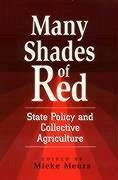This volume provides a radical and timely corrective to received wisdom about the seemingly inevitable transition from communism to capitalism. Arguing against popular misconceptions that portray collectivized agriculture as an unqualified failure, the contributors draw upon newly available local sources to illuminate its costs, benefits, successes, and failures. They highlight the wide variety of state policies, local responses, and economic outcomes, as well as the influence of local geography, political structures, and economic institutions. With its institutionalist analysis of both the causes and impacts of policy differences, this study provides lessons of continuing relevance to the many countries grappling with agrarian reform.
Hinweis: Dieser Artikel kann nur an eine deutsche Lieferadresse ausgeliefert werden.
Hinweis: Dieser Artikel kann nur an eine deutsche Lieferadresse ausgeliefert werden.








